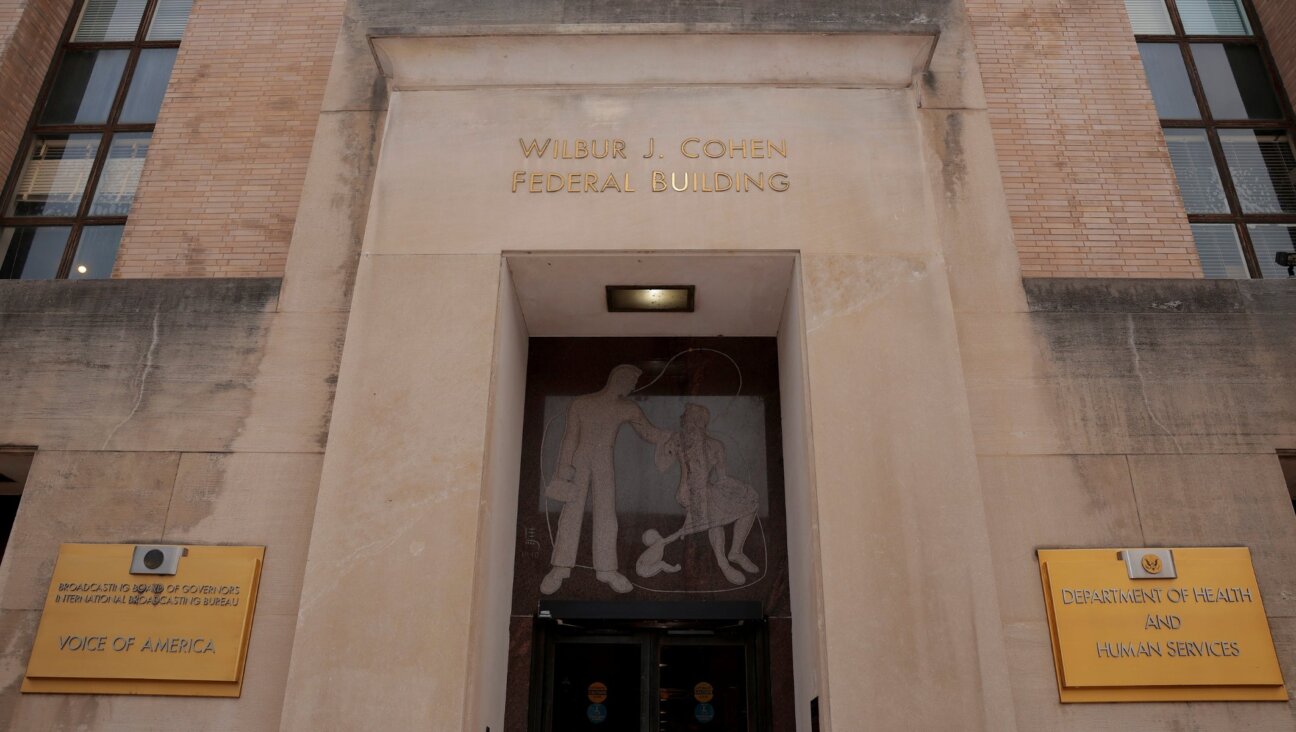Looming Sequestration Cuts Cause Split Among Israel Aid Advocates

Sequester Split: The sequester cuts are threatening to undo a bipartisan consensus about aid to Israel. With major cuts looming, AIPAC, which just held its national conference, is pushing for Israel to be treated differently. But others worry about a backlash. Image by getty images
In an effort to save aid to Israel from mandatory, across-the-board cuts now being imposed on all discretionary federal programs, pro-Israel activists are opening the door on a dramatic course of action they have rejected repeatedly in the past.
Members of the American Israel Public Affairs Committee, the largest pro-Israel lobby, are refusing to foreclose any option — including special legislation for Israel, if necessary — to keep aid to the country from being cut.
An official from the lobby explicitly refused to rule out pursuing such legislation, even if that would enable Israel alone to escape the cuts hitting every other foreign aid recipient, not to mention those hitting domestic programs.
AIPAC officials vehemently reject labeling anything they are considering as constituting an “exemption” for Israel. But the lobby’s shift signals a possible break with AIPAC’s years-long policy of firmly embedding aid to Israel, the largest recipient of American foreign assistance, within America’s broader foreign aid program.
And while it could spare Israel from facing at least $155 million in aid cuts this year, critics warn that it could damage the cause of aid to Israel greatly in the long run.
The uniform cuts to Israel and to all other discretionary programs are mandated by “sequestration,” Washington’s term for the forced deficit reduction regime that Congress agreed to in the Budget Control Act of 2011.
Under the provisions of that law, the failure of a bipartisan panel of lawmakers to come up with a measured program of government spending reductions by March 1 now requires across-the-board cuts.
Amounting initially to some $85.4 billion in fiscal year 2013, the cuts are split evenly between defense and nondefense categories. Some major entitlement programs, such as Social Security, Medicaid and veterans benefits, are exempted.
Historically, Israel and its supporters in the United States have been among the most successful parties in ensuring American assistance. Aid to Israel, budgeted through the State Department’s international affairs program, has grown constantly for more than a decade and now stands at $3.1 billion. All the money is earmarked for military use, most in the form of Israeli purchases from American defense contractors. In addition, the Pentagon budget gives Israel more than $450 million in extra aid for missile and rocket defense systems.
The administration has already used its discretion to minimize the cuts to Israel forced by sequestration to $155 million, nearly $100 less than the initial estimated cut. But even this reduced cut has alarmed pro-Israel supporters. On March 5, as their annual policy conference came to an end, thousands of AIPAC delegates made their way to Capitol Hill for lobbying meetings with their Senate and House representatives. In the meetings, which covered each and every congressional office, the AIPAC activists urged lawmakers to repeal the cut.
The request, which was formulated carefully by AIPAC officials, stressed the lobby’s preference for a solution that would roll back all sequestration cuts, not just those hitting Israel. “We said in the meetings that sequestration is a bad policy because it haphazardly cuts programs regardless of their value,” one AIPAC official told the Forward. “We also argued that full assistance for Israel is imperative.”
The source, who spoke on condition of anonymity, stressed that the lobby did not explicitly ask for an exemption for Israel but rather was “exploring” the “possible vehicles” for maintaining aid at its pre-sequester level. He resisted any invocation of the word “exemption.” But the lobby’s website made clear the importance that AIPAC attaches to Congress’s current aid levels to Israel specifically.
“Despite ongoing budget woes, it is critical that the United States live up to its aid commitment to Israel,” AIPAC states. “As our one reliable Middle East ally, Israel serves critical national security objectives. Any reduction in that aid would send the wrong message to Israel’s — and America’s — enemies.”
The group’s policy agenda does include, however, a call for maintaining a “robust foreign aid budget.”
The best outcome for AIPAC and for all pro-Israel activists would be congressional legislation to replace sequestration with an agreed-upon budget plan. Such a plan, pro-Israel activists say, would all but guarantee a full restoration of aid to Israel, thanks to the strong bipartisan support the country enjoys.
Right now, hopes for such a spending deal seem dim. AIPAC, therefore, is not ruling out other options. One option would be specific legislation to restore aid exclusively to Israel. Another, explained a congressional staff member who participated in meetings with AIPAC members, would be having the administration use its power to re-obligate funds from other countries to Israel within the same budgetary account. That process, which is considered to be easier, merely requires that the administration give Congress notification of its plan.
“This is still premature,” the AIPAC source said. But he stressed, “We need to find a way to ensure full assistance,” and he refused to rule out any option for ensuring that aid was restored in full.
Even such a tentative move breaks sharply with AIPAC’s decades-long policy, which underscores the need for foreign aid to many countries as a tool of American power in the world. The rationale for this stance was not spread-the-wealth altruism — it was good politics. Israel’s bipartisan popularity has made it an engine for getting the overall annual foreign aid appropriation through Congress, even garnering support among lawmakers who otherwise might oppose it.
This, in turn, has made aid to Israel popular among the entire community of foreign aid supporters and many of the countries that receive the benefits. Treating Israel as a separate category could strip foreign aid to other nations of one of its strongest shields, and deprive aid to Israel of its broader support in the foreign aid community.
J Street, the dovish pro-Israel group, immediately understood the implications of AIPAC’s rhetorical shift after getting word of the pitch made by AIPAC members on Capitol Hill. Dylan Williams, J Street’s director of government affairs, told the Forward that “it seems a little tone deaf. We have a unique public perception issue.” He added that congressional aides had told him they were “surprised that some groups — that people from AIPAC — were asking for this.”
In a statement issued soon after the AIPAC mission, J Street warned that any move to separate Israel from the sequestration’s broad cuts would hurt the Jewish state’s interests by appearing to put Israel’s aid needs “above those of the millions of ordinary Americans who are being hurt, or the vital domestic programs that are taking a hit.”
M.J. Rosenberg, a former AIPAC staffer who is currently among the lobby’s harshest critics, wrote on his blog, “Demanding that Israel be exempt from cuts that virtually every American will feel seems so counterproductive as to almost be suicidal.”
Joel Rubin, of the liberal think tank the Ploughshares Fund, disagreed. When lobbying for funding, the former Senate staffer said, it is each interest group for itself. “I don’t think there is anything untoward for an interest group to come up and say ‘Not me,’” Rubin said, referring to AIPAC’s attempts to save aid to Israel from the cuts.
But AIPAC leaders, along with others, see a bigger problem beyond the sequester challenge: a rapidly declining interest in foreign aid generally amid growing budget austerity.
“Our concern is that the international affairs budget will continue to see a disproportionate cut,” said Richard Parker, communications director of the U.S. Global Leadership Coalition, an advocacy group supporting foreign aid. He noted that American assistance to countries overseas has already seen a 20% cut in the past three years.
A recent online poll posted on the website of conservative-leaning Fox News asked viewers whether the United States should “continue to make huge foreign aid payments while domestic programs face drastic budget cutbacks.”
Ninety-three percent of respondents thought it was time to cut foreign aid. While unscientific, the online poll can give a sense of the mindset of some voters.
Awareness of this sentiment moved House Majority Leader Eric Cantor in 2010 to suggest separating aid to Israel from other foreign aid programs for which the Republicans supported cuts. AIPAC back then clearly signaled its opposition, and the idea was quickly shelved. The lobby’s different response this time suggests that AIPAC is preparing for a future scenario in which assistance to Israel will need to be distinguished from other programs facing the chopping block.
This is part of the rationale behind a recent bill, written before sequestration took place, that is sponsored by Republican Ileana Ros-Lehtinen and Democrat Ted Deutch. The bill asks Congress to define Israel as a “major strategic partner” of the United States.
The new and nonbinding definition would be, at first blush, of only symbolic importance. But according to the same AIPAC official who addressed the sequester issue, if the measure passes, it could help Israel’s supporters ensure that aid to Israel is safe.
“In the future,” the AIPAC source said, “it creates an even stronger commitment for funding Israel.”
Contact Nathan Guttman at [email protected] or on Twitter @nathanguttman

















